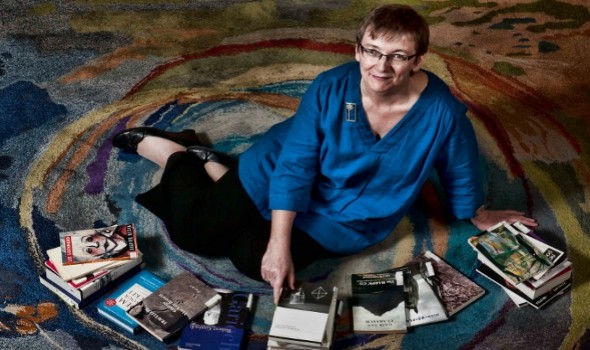Robyn Marsack - Director of the Scottish Poetry Library, Edinburgh
Robyn Marsack - Director of the Scottish Poetry Library, Edinburgh

I was born and grew up in New Zealand, in Wellington. I was born in 1953, and left in 1973. Passing the half way mark, when you realise that you’ve been longer in the country you’ve come to than in the country you were born in, is a very significant moment. Then you have those big questions such as what do you call ‘home’. I still refer to Wellington as home. But, of course, home is where my family is, and my family is here, so what you call home is a loaded decision, I think, and it can vary depending on whom you’re speaking to.
When I went to England, I was predisposed to love what I found there because I had read English literature for as long as I could recall. My head was full of descriptions of English landscapes, English art, English buildings, English history. I came to study English literature, and when I was about to leave Oxford, I met the person who later became my husband, who is Scottish, so it was a very fortunate crossover.
In 1999, I saw the advertisement for the position of Director of the Scottish Poetry Library and I thought, 'That’s an extraordinary job. I won’t have a chance for it, but I’ll try.' And then I was appointed! I’ve been there ever since.
I’m very privileged to be right at the heart of literature, and Scottish creativity in that sphere. I feel passionately that I need to be an advocate for Scottish literature and Scottish poetry. A poem – for example at weddings or funerals – can say things for us that we can’t articulate for ourselves but that we recognise. It’s immensely consoling to recognise our own emotions or ourselves; we immediately feel that we’re less isolated, less peculiar, less stupid because our emotions have been shared and expressed by somebody else.
We hate the idea of people who are no longer very mobile, and whose mental faculties are diminishing just sitting in chairs, left alone for most of the day or watching television that they don’t understand. The sessions the Scottish Poetry Library offers to care homes are a combination of storytelling and reminiscence and poetry. People have a lot of poetry buried in their minds. They can still recite a bit of Burns, they can recite a bit of Wordsworth. If your mind is going and I say to you “What’s your name?”, it may be a horrible moment before you remember what it is. But if I say “Here’s a poem by Wordsworth about daffodils and I’ll read it for you,” they’ll say, “Oh, I remember that my mother grew daffodils," or, “I remember that we learnt that poem when I was 7.”
Migrants are always going to be in a difficult position because when times are hard, as they are now, then people look for other people to blame, or say that the country is not big enough to contain them. I was very heartened by the example of the Glasgow Girls who banded together and went to Parliament and said you can’t deport our friend who’s an asylum seeker. When my daughter was in a primary school, which was in a very ethnically mixed area, I was struck by the fact that she never identified somebody by their skin colour, which would not have been the case when I was a child. My mother would ask “Who is your friend?” and I’d say, “She’s an Indian girl called so and so.” I don’t think they do that now, and that seems to me a hugely positive change.
Interview by: Migrant Voice Photo by: Karen Gordon


